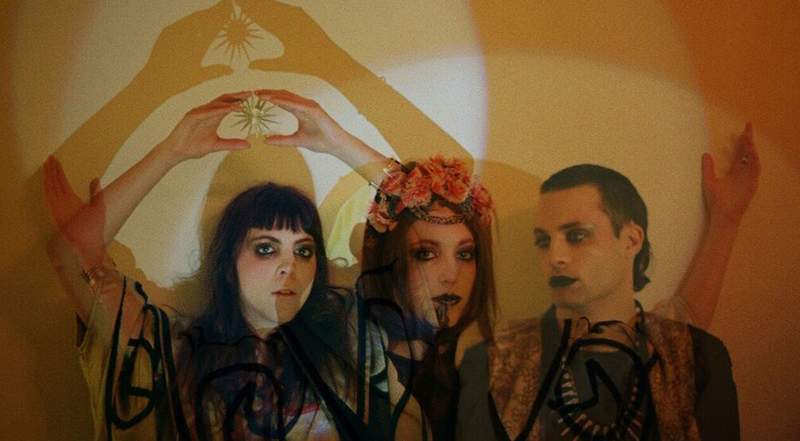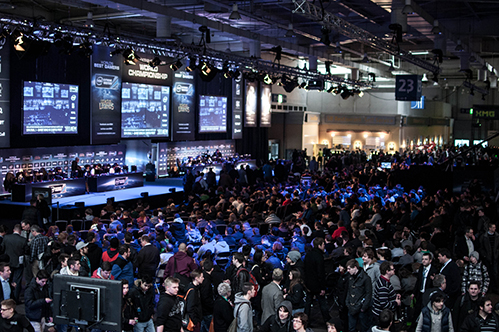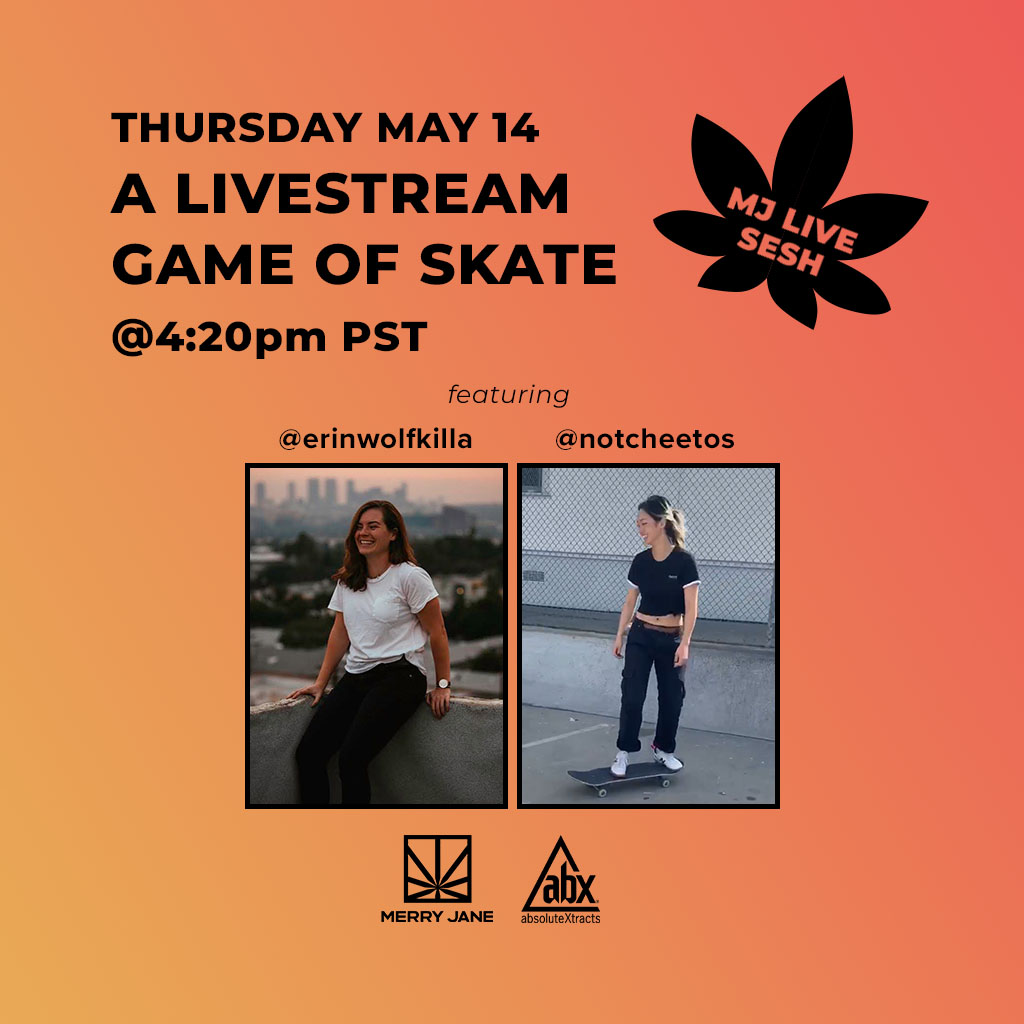The electro-psych trio DOOMSQUAD originates from the artistic crevices of Toronto, but when it came time for the group to write and record their sophomore LP, Total Time, which Bella Union released this past April, siblings Trevor, Jaclyn, and Allie Blumas decided to head south to the New Mexican desert. The result of their journey was a hypnotic and enchanting album filled with spontaneity and spirituality, one that connects new-age dance music with the deep-rooted thralls of nature.
DOOMSQUAD’s venture into trance-infused dance music began back in 2010, as the familial outfit found a common interest in dance culture, enthralling rhythms, and the unknown. In 2014, they released their debut album, Kaboogie, which they recorded in the woods of Northern Canada, a setting that certainly influenced the wild sounds on that record. So, it should come as a surprise to no one that, on their latest release, the New Mexican desert played a big part in the band’s thoughts and lives and Total Time’s atmospheric sound.
On tracks like “Pyramids on Mars” and “Solar Ass,” DOOMSQUAD takes listeners on a dance-induced trip to a dry and arid place, represented by pulsating bass and structureless sounds that seem to stretch out through a desert landscape for miles upon miles. MERRY JANE sat down to chat with Trevor and Jaclyn about their hallucinogenic adventure into the desert to record Total Time, the joys of playing 420-sponsored concerts, and the long-standing cannabis scene within their Canadian homeland.
How would you describe the band’s evolution from previous work to Total Time?
Trevor Blumas: I don’t know if there was a real conscious evolution other than the fact that we’d just grown as musicians, as performers, and as a unit together. Our processes of writing and working together become more embedded and engrained, and kind of elevated. Total Time reflects that. Some of the processes and rituals we used in trying to write our music changed. For our first album, it was this natural, organic thing, and then we found what works. What really distinguishes Total Time is the whole process behind it. The first two albums were us just doing what we were doing and working organically, but with Total Time, we consciously made an effort to go into the desert in New Mexico, consciously made an effort to get into these practices and rituals and habits that we know will help us write and get to a creative point.
Why did you decided to record Total Time in the New Mexican desert?
Jaclyn Blumas: We were familiar with the desert, and had natural attachment to the desert for a while now. We knew a little bit about the place, and we wanted to pick an environment where we could be for a long period of time, where ideas can really soar. One of the biggest surprises [was] dealing with time in all different aspects. We turned off all of the clocks, we had no Wi-Fi, we weren’t using our phones. We never knew what time it was. For the first two weeks, we were consciously trying to check our circadian rhythm, when we were sleeping, eating, making music in the middle of the night and morning—we switched everything up. That absolutely surprised us to see what happens when you do that. Things got really weird at moments because we were losing our sense of time; it was frustrating, interesting, and nice, and all of those things can be heard in the record.
The music video for “Pyramids on Mars” is a trip. What were those visual about?
T.B.: The video was based around these dichotomies and binaries. The number one thing that started it all was this idea of scarcity—everything was so dry. Where we’re from in [the province of] Ontario, there’s so much water, an abundance of natural resources. So, while we were living in New Mexico, we had this really binary distinction between drought versus an overflowing abundance. Something else that really defines our music is the feminine versus the masculine; that was the idea that the twins symbolized. The whole video is based on the confrontations between different binaries.
Did cannabis play a major role in the writing and production of the new album?
T.B.: More than cannabis, to be honest, magic mushrooms was probably the star of the album. The original jam session that sparked the idea of the album came from a mushroom bender. Out of that we came up with sweet organic roots that were written and inspired in that state of mind, and when we were in New Mexico there was definitely a lot of that, and cannabis too. Not that we were taking mushrooms all of the time, but when you’re in the desert for a month and a half, you want to maintain this higher, elevated state.
What’s been your craziest cannabis experience while you were on the road?
J.B.: We played a 420-sponsored event last year in Portland when we were on the road with Fucked Up. That was amazing. Before the show, they had a rep from the company come in and bring us tons of cannabis treats. We were digging into ice cream, honey, THC lube, and all these different kinds of weed as well. So, we all obviously cracked right in. After we played our set, it felt like the longest show I’d ever played. We were playing with Fucked Up in their band on that tour, and it felt like the longest Fucked Up set ever, but it was so awesome.
How would you describe the cannabis scene in Toronto?
T.B.: Weed in Canada has always been a thing; it’s a pretty chill national pastime. On a social level, it’s just been around forever. We grew up with it all around us, so it’s really a non-thing. But, on a political and activist level, it’s exploding right now, especially in Toronto. Our Prime Minister announced on 4/20 this year that by the next 4/20 weed would be completely legal in Canada. It was already a dominant industry in B.C., but a lot of those companies are moving into Toronto and it’s exploding. If a business is going out and you see a "for lease" sign, you can pretty much guarantee that a dispensary is going to open up there. We have so many, one every block. There are a lot of jobs being created from it. There was recently a big job fair in Toronto at the convention center and one of the biggest job sectors there was the cannabis industry. They were offering thousands of available jobs, which is especially great for the youth in Canada. There is a bit of friction because the government is starting to withhold regulations and get these businesses used to having to work with them, while the cannabis industry is fighting for as much liberty and freedom as it can.
Which of you siblings is the biggest pothead?
T.B.: We’re all advocates for sure, just for the sheer idea that it makes absolutely no sense why cannabis is illegal. In terms of the biggest pothead, it rotates, it cycles around. I guess it all depends on where we’re at.
J.B.: For my birthday, I just got a vape called “This Thing Rips!” I love it. I mean, it’s just THC oil and the vape stick, but I really love it. I’m all about "vape life" at the moment. That’s my current mentality and mantra. [Laughs.]











